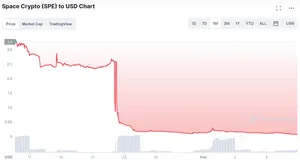Bitconnect founder indicted by federal grand jury on charges of orchestrating a global Ponzi scheme
- "BitConnect Founder Indicted in Global $2.4 Billion Cryptocurrency Scheme", United States Department of Justice
The Associated Press continues to mishandle its NFT fiasco with mass Discord bans and scrubbing of messages
Nelson Mandela's paintings from prison to be sold as NFTs
The Associated Press wants to sell you an NFT of migrants adrift at sea
However, on February 24 they announced that their newest NFT would show a short, top-down video of around fifty migrants crammed into a small inflatable boat, adrift at sea in the Mediterranean. Any goodwill the AP might have had for their NFT project was likely shattered by their choice to monetize a video of human suffering. The already horrific NFT announcement was particularly ill-timed, given its juxtaposition on many Twitter feeds amongst news of Russian military action against Ukraine. The Associated Press deleted the announcement tweet four hours later.
Founders of BitMEX crypto exchange take guilty plea, pay $10M fine for failing to implement an anti-money laundering program
In March, the third co-founder, Sam Reed, also pled guilty and agreed to pay a $10 million fine. In August, top BitMex employee Gregory Dwyer entered a guilty plea and agreed to pay a $150,000 fine.
BitMEX had attempted to evade sanctions by claiming they didn't serve customers in the United States, though in reality they served thousands of U.S. customers and marketed in the U.S. At one point, when an early investor inquired as to why an investment in the company hadn't triggered a report to regulatory authorities, Delo responded with a meme of a man smiling, superimposed with the text "Incorporated in Seychelles, come at me bro". Hayes and Delo face a maximum sentence of five years in prison as a result of this plea. The exchange had in August paid $100 million to settle a separate lawsuit from the Commodity Futures Trading Commission, in an agreement which had also required them to implement proper blocks to prevent U.S. customers from using the service.
- "Founders Of Cryptocurrency Exchange Plead Guilty To Bank Secrecy Act Violations", The U.S. Attorney’s Office, Southern District of New York
- "BitMEX to Pay $100 Million to Resolve Regulator’s Lawsuit Over Crypto Derivatives Trading", The Wall Street Journal
- "Third BitMEX Founder Pleads Guilty to Anti-Money-Laundering Violation", The Wall Street Journal
- "Top BitMEX Employee Pleads Guilty to U.S. Charge", The Wall Street Journal
Space Crypto game surprises its player base with new, disadvantageous tokenomics
- Space Crypto (SPE) to USD Chart, CoinMarketCap
- Tweet by mikacrypto__
Utility promising to restore mining performance on Nvidia GPUs actually malware
NBA player De'Aaron Fox ditches his NFT project after raking in $1.5 million
Suddenly, on February 23, the project deleted its social media accounts and most of its Discord. Fox wrote in the remaining Discord announcements channel that "The time and attention that y'all deserve and that I wanted to give you all/what this project requires, was not known to me and I overstepped and stretched myself too thin, trying to do this project in the middle of an NBA season." He promised to send anyone who bought more than five NFTs (which would have cost ~0.4 ETH, around $1,300, if bought at mint price) a signed jersey (available for purchase online for around $100).
The following day, after some attention was drawn to the rug pull, Fox released a Twitter statement that said basically nothing at all, and made no mention of reimbursing holders. Meanwhile, the floor price of the NFTs dropped to around 0.003 ETH ($8).
Seller withdraws Sotheby's CryptoPunks auction minutes before it's due to go live, likely due to "tepid" reception
However, 0x650d withdrew the sale only minutes before the auction was due to start, tweeting only "nvm, decided to hodl". CoinDesk reported that, "Perhaps contributing to 0x650d's reversal were rumors of a tepid reception for the CryptoPunks mega-lot. Three sources, including one bidder on-site at Sotheby's, told CoinDesk that the highest pre-bid offer was $14 million, which was also the reserve price."
Journalist says she's been able to use chain analysis tools to discover the person behind the 2016 hack of The DAO
Journalist and researcher Laura Shin reported on February 22 that she had successfully used a forensics tool from Chainalysis to discover the identity of the hacker: Toby Hoenisch, a co-founder of the TenX "crypto debit card" project. Hoenisch refused to speak with Shin, and has denied the allegation.
For a technology that makes lofty promises of anonymity and privacy, increasingly-powerful technology is being released that at least claims to be able to unwind crypto mixing and make other connections between wallets and transactions that were previously extremely difficult, if not next to impossible. I imagine there may be a few people behind various crypto crimes sweating a bit as these technologies progress and threaten to unmask those behind other hacks and scams.








